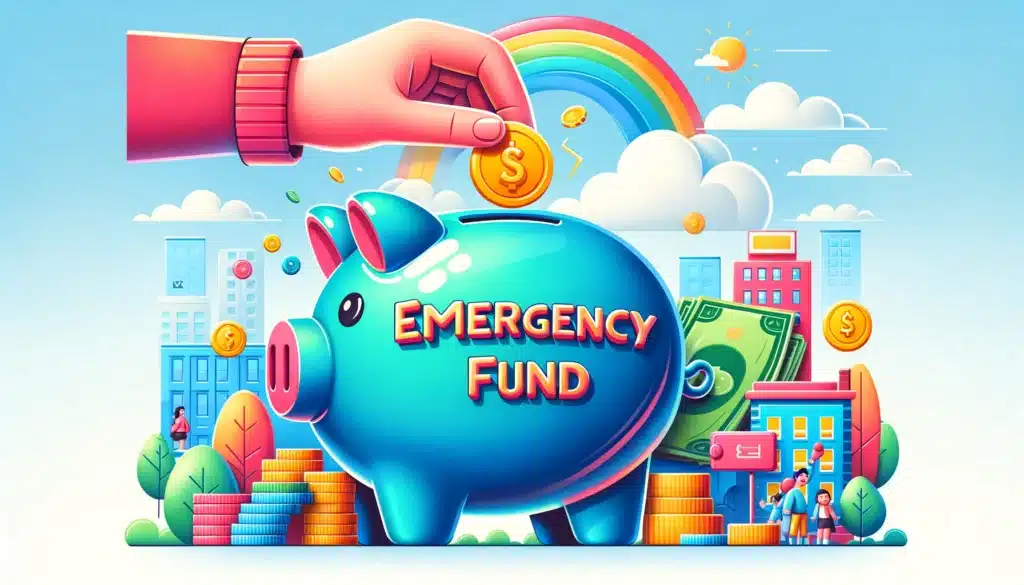Editorial Note: We earn a commission from partner links on Doughroller. Commissions do not affect our authors’ or editors’ opinions or evaluations. Learn more here.
Have you noticed that most personal finance advice is written for people already in a financial mess? Take, for example, one of the most popular personal finance books of all time–Dave Ramsey’s The Total Money Makeover. That book has helped millions. But it’s written for those who have made poor financial decisions.
But what about helping people avoid financial messes in the first place?
The best time to set individuals on the path to successful financial management is as young children. Even kids can learn basic concepts like saving for what they want and working hard to earn money. However, many people learn the specifics of sound financial management during high school and early adulthood. During these few years, most students manage some money, either allowance or income from a part-time job. They’re also on the verge of making some of the biggest financial choices of their lives: where to go to school, how to pay for school, and what career to choose.
Luckily, many things high school students should know by the time they graduate are very basic. Here are 14 lessons we suggest teaching your high school student before they leave the nest.
1. You’re Never Too Young To Save
Kids can and should have savings goals and even retirement accounts. One excellent personal finance book for kids teaches that youngsters as little as 5 or 6 years old should have to set savings goals. Then give them a small allowance, and watch as they learn to make tough choices. Should I buy the $1 pack of gum or save that money for my longer-term goal?
In high school, this can mean helping your teens set mid-term savings goals. They can save for their own prom dress, video game system, or car.

But high schoolers should also work towards longer-term savings. For instance, you can set up a Roth IRA for a minor. It’s a great way to show them how to save for the long term. And they don’t necessarily have to use that money for retirement. They could also choose to use it for a down payment on their first home.
Related: Best Money Apps for Kids, Teens and Young Adults
Book Review: Retire Before Mom and Dad
2. Compound Interest Is a Beautiful Thing
Explaining compound interest can help a savings-resistant teenager find the motivation to stash away cash. This calculator from Investor.gov can help you calculate how much interest that Roth IRA could earn if your child starts saving right away.
For instance, start with $1,000 and add $25 a month for 40 years. If the investment earns 8% and is compounded annually, your high school student could have nearly $100,000 in savings well before retirement age.
You can also make this apparent by offering compound interest from the Bank of Mom and Dad starting at an early age. Consider giving your child a nickel each week for every saved dollar of allowance. It quickly becomes apparent how fast this extra cash can add up–much more so than if they put it in a bank account earning .01% APR.
3. Compound Interest Might Bury You
On the flip side, be sure to talk about how compound interest could bury a young spender in debt. This simple credit card calculator helps illustrate how a small credit card debt can quickly snowball out of control.
The calculator shows that a $1,000 credit card charge with a 19% APR could take eight years to pay off and would cost $998 in interest. Just seeing these numbers on paper can help a student grasp the dangers of uncontrolled debt.
Again, you can demonstrate this issue with the Bank of Mom and Dad. If your teenager can’t wait to save money for the next hot thing, consider lending them the cash with a steep interest rate. That’s safer than them taking out a formal loan, but it can also teach them how fast compound interest can work against them.
4. You Don’t Have To go into Debt To Pay for College
Contrary to popular belief, student loans are not required for a college degree. Some colleges, like Davidson College in Charlotte, N.C., work with students to ensure they don’t go into debt for school. Others simply offer a great education at a fraction of the private school price.
Students have many options for college without debt: attend part-time, work while in school, choose a cheaper school, graduate early, and start at a community college.
This isn’t to say that going to school debt-free should be every student’s goal. Sometimes the student loan debt is worth it. If you launch into a high-paying field within four or five years of high school, student loan debt isn’t all bad. But students shouldn’t just take this debt as a fact of existence in college. And they should think carefully about every dollar they sign up to pay back.
5. College Degrees Are Not All Created Equal
Choosing the right school is important, but choosing the right degree maybe even more so. Sure, high school students should follow their interests and talents when choosing a career path. But they should also become familiar with the current and probable future job market.
Just having a college degree is no longer enough to guarantee a decent job. This means that students must do as much research as possible to ensure their degree will lead to excellent job opportunities.
One way to help students think through this is to have them do internships and job shadowing during high school. Sometimes, exposure to unknown fields can light a new passion they never knew existed.
6. Everyone Needs an Emergency Fund
As soon as a high school student leaves home, they need an emergency fund, preferably one that doesn’t involve a line of credit. A line of credit can make a decent emergency fund for those of us with more maturity and money management experience. But for teens and twenty-somethings just beginning to manage their money, having cash to fall back on is essential.
It’s a good idea to help your high school student save a small emergency fund well before graduating from high school. This money can be used for emergency car repairs and other issues that might crop up during college.

If you’re concerned that your young college student might spend out of this account for non-emergencies, consider a co-signed account that requires your input for spending. Or at least make it a joint account that you can monitor. Just having the accountability of someone else watching what you’re spending can make you think twice before swiping that debit card.
7. A Car Isn’t a Good Investment
Chances are that buying a car will be the first major financial decision a high school student makes. And most high school students drool over high-end SUVs or fancy muscle cars.
But cars are (quickly) depreciating assets. Cars are not a good investment. High school students should strive to pay cash for cars, even if that means driving around a beater.
If you haven’t already had the conversation about the problem with paying interest, car buying time is the time to do it. Some students may truly need a car to enable them to maintain a job or get to after-school activities. And that’s fine. But taking out an interest-bearing loan for a car should be a last resort.
8. Keeping Up With the Joneses Could Wreck Your Life
It’s human nature to want what your neighbors have and to be like others. And wanting to have nice things isn’t all bad. But allowing what others have to drive our financial choices, particularly when those choices involve spending beyond our means, is a slippery slope.
Teenagers are developmentally primed to fit in with their peers, which is why they worry so much about what others think. So this lesson can be a difficult one to teach. But if a teenager can step back from the drive to keep up with the Joneses now, they will make much better financial choices in the future.
Again, you can make this an object lesson by letting your high schooler try to fit in. For instance, if you usually spend $250 on back-to-school clothes, hand it over to your teenager. Just make sure they understand that you won’t be there to bail them out. If they spend $125 of that $250 on a pair of expensive designer jeans that look cool, it’s up to them to make the remaining money stretch to fit all their back-to-school needs for the year. And if they end up having to dip into their own money or shop Goodwill to “keep up with the Joneses,” so be it.
9. Financial Institutions are There To Sell You Things
It’s easy for students–and the rest of us–to think that banks and lenders are our friends, especially when students are trying to finance a college education.
But the fact is that financial institutions exist to make money. And they make money by selling financial products. This doesn’t mean students should avoid dealing with financial institutions. It simply means they should be shrewd when doing so.
This is an especially important conversation to have before your student steps foot on a college campus. College orientations are rife with booths from various local banks and large credit card companies peddling their wares. Again, these wares aren’t necessarily bad. But students can easily sign up for way more credit than they have any business handling before college even starts.
10. Budgeting Doesn’t Have To Be a Drag
Most adults hate the word budget, and many teenagers have never even considered living on one. If they do think about it, they probably assume that living on a budget means never buying a pair of jeans, going to a movie, or spending any money in general.
But living on a budget isn’t about never spending money. It’s about taking control of your money to meet financial goals. Students who understand this and who start budgeting while they’re in high school will be set up for a life of financial happiness and success.
High school is the perfect time for teenagers to learn to budget. You can give them this power by handing over a lot of the money you would have spent on them. For instance, give them complete control over their lunch money. If they run out of money by Wednesday a few weeks in a row, they’ll quickly learn to budget their spending for the week, so they don’t have to go hungry or bring a PB&J from home.
Tip: FamZoo is a great app for older teens, especially those going off to college. It assigns a purpose to every single dollar your child earns and spends, creating incentives for them and helping track their savings progress.
11. Not All Debt Is Bad Debt
Two or three generations ago, people didn’t go into debt. Many of our great-grandparents probably paid cash for their homes. These days, living completely debt-free isn’t always possible or even wise.
High school students need to understand how to stay out of the most expensive forms of debt: long-term student loans, depreciating car loans, high-interest credit cards, etc. But they also need to understand when to use debt and how to manage it wisely.
One way to help them figure out this equation is to research where they want to live someday. They can look at current home values and mortgage rates and figure out what it would cost them to buy a home responsibly. Then talk about why mortgage debt isn’t always bad and even how they can eventually use credit cards to net some great financial rewards.
12. Credit Scores Are Important
Like I said above, living completely without debt is tough, if not impossible, today. People are rarely able to cover the cost of a home with absolutely no debt. So students should learn early on about their credit scores, including how to maintain one.
Again, you can help by giving them some exposure early on. As soon as your child takes out their first student loan, they’ll have a credit report and subsequent score. Talk about what a good score is and how to maintain excellent credit.
You can extend the lesson further by giving your kid access to a secured credit card. These require a deposit, so lack of payment doesn’t cause a hefty and immediate consequence. But this can help them build up credit over time. And keeping tabs on their score while they do this is a great way to motivate them to keep building credit for the future.
TIP: Experian Boost™. It’s free and can see when you pay your utility and mobile phone bills. Every payment you make on time can boost your credit score.
13. Living Takes Money — A Lot of It
Most teenagers have no concept of how much it takes to cover the basic costs of living. Why should they? It’s not like they buy all your groceries, pay your mortgage, or cover insurance premiums.
The problem is that this lack of awareness can leave young adults with sticker shock when they get out on their own. You can help prepare your high school student for the real cost of life by letting him in on your family budget, having her shop for groceries, or requiring that he pay for his car insurance.
One good option here is to run an experiment with pretend money. Talk to your teenager about the life they want to lead someday. Research their potential income and cost of living where they’d like to live. Then give them a month’s salary in play money. Go through a typical budget, and have them fork over the money for basics like rent or a mortgage, groceries, student loan payments, and vehicle expenses. When they see what’s left, they’ll know how much it costs to be an adult.
14. Money Isn’t Everything
It’s easy for high school students to get caught up in dreams of giant homes, luxury cars, and tropical vacations when they land a high-paying job in the future. But remember to teach your student that money isn’t everything.
This comes into play when students choose a college major. Yes, high school students should choose a major that will help them become employable. But they shouldn’t choose a high-powered, high-paying job just because of the money. There’s a balance to be had, and you can teach this lesson best by demonstrating it in your own life.
Lead By Example
Remember, it’s important to set a good example for your kids. It’s much easier for a child to adopt healthy financial habits when they watch their mentors successfully practice them daily.

